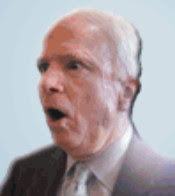McCain's '97 Lobbyist Bill Would Cripple Current Campaign
Senator John McCain has a lobbyist problem. This past week, as several aides resigned because of their work representing unsavory governments, his campaign implemented a new policy governing these potential conflicts of interest. That led to the departure of additional staffers, including former Rep. Thomas Loeffler, a key adviser and fundraiser.
The McCain camp has insisted that the resignations are nothing more than evidence of the Senator's sincerity in combating outside influences. But the truth, reform groups say, is far from adulatory: McCain's current policy simply doesn't compare to the ethical commitments he championed earlier in his career.
Just twelve years ago, when McCain was politically recuperating from his involvement in the Keating Five scandal, he introduced legislation that would, if implemented today, cripple his presidential campaign.
In March 1996, McCain took to the Senate floor to offer a bill that, in his own words, "would ban a candidate or a candidate's authorized committee from paying registered lobbyists."
In order to root out the moneyed influences, McCain continued, Congress had to unequivocally cut off the flow of campaign cash.
"Registered lobbyists who work for campaigns as fundraisers clearly represent a conflict of interest," he added. "When a campaign employs an individual who also lobbies that Member, the perception of undue and unfair influence is raised."
The legislation, introduced twice, never passed.
Fast-forward a dozen years and the political dynamics have clearly changed. Now the GOP standard barer, McCain has 115 lobbyists either working or raising money on his behalf. Many of these individuals have taken a leave of absence from these positions in order to help with the campaign. But others have held, simultaneously, fundraising and lobbyists positions.
In addition, the Senator has 70 registered lobbyists who have bundled money on his behalf - raising at least $100,000. On top of this, the Center for Responsive Politics reports that the Arizona Republican has received more than $610,000 in direct donations - not bundled cash - from lobbyists.
His recent, self-implemented, campaign policy is designed to counteract the image that such a fundraising apparatus suggests. "No person with a McCain Campaign title or position," the document reads, "may participate in a 527 or other independent entity that makes public communications that support or oppose any presidential candidate."
But critics and reform groups not only argue that the policy is too little too late, but that McCain can no longer claim the ethical high ground on which he has built much of his political career.
"I think because Mr. McCain believes himself to be an ethical man he believes you can't question his ethics. But the fact of the matter is, he has talked a good game but he isn't walking it. And you can't be the guy who positions himself as a reformer and then plays fast and loose with the rules," said Melanie Sloan, executive director of Citizens for Responsibility and Ethics in Washington. "I think he was sincere after Keating Five, and he obviously really believed in campaign finance reform, because he pushed it when it really didn't helped him. But I think over time that's changed. At the time he [made this speech] he wasn't thinking how it would affect his presidential run."
Moreover, they add, it is not just the quantity of lobbyists who have surrounded McCain. It is the quality. Indeed, some of the very people funding the Arizona Republicans run for the White House are those who would be interested in favors should he get there. As the New York Times reported in April 2008, several of McCain's bundlers have business interests before the Senator's own Commerce Committee:
Kirk Blalock, of the lobbying firm Fierce, Isakowitz & Blalock, leads Mr. McCain's young professional group and has raised over $250,000 for him; his clients include Sprint Nextel and Viacom.Kyle McSlarrow, chief of the National Cable and Telecommunications Association, the lobbying arm for the cable industry, has raised over $100,000 for Mr. McCain. He and others in the cable industry recently butted heads with Mr. McCain over a proposal that would allow customers to pick and choose which channels they received.
McCain's supporters insist that his ethical compass is sound enough to ignore these potential conflicts of interest. And indeed, as McSlarrow can testify, raising money for McCain's campaign doesn't always bring with it a return of legislative favors.
"When it comes to McCain," Wayne Berman, another McCain bundler whose clients are affected by McCain's chairmanship at Commerce, told the New York Times, "there's just absolutely no concern whatsoever that he is going to be influenced by lobbyists. He takes on issues as he sees them. It doesn't matter whether his best friends are on the other side or not."
But as it stands now, critics believe that McCain's bevy of lobbyists represents a political liability. On Tuesday, Moveon.org put out one in what will likely be a series of campaign commercials, cataloging the "worlds worst tyrants" for whom Charlie Black, one of McCain's top aides, had previously worked. The list includes Ferdinand Marcos, Mobuto Sese Seko, Angolan rebel Jonas Savimbi and Ahmad Chalabi.
"Charlie Black said he didn't do anything wrong," the spot says. "John McCain should tell Black he did."

.jpg)

3 comments:
Off-topic:
If you haven't seen this yet, it may be useful for this site.
Summary: Hagee (an evangelical leader that McCain sought and received the endorsement of) says something ludicrous about Hitler and Jews nearly a decade ago.
I told you that a "fishing expedition" would yield tremendous catches. And boy look at the bounty the "internet" has provided.
http://www.huffingtonpost.com/2008/05/23/mccains-ethical-dilemma-c_n_103216.html
In today's hot tip, we find out that McCain's campaign lobbyists are or were involved with Lorillard Tobacco (to block the cigarette tax) and the Yucca Mountain Nuclear Waste Site (which if authorized would have put tons of nuclear waste on an earthquake fault line http://www.klas-tv.com/Global/story.asp?s=7120584)
Burma, Zaire, Keating 5, the US Chamber of Commerce, Swift Boating, now Yucca Mountain...is there any scandal these guys are NOT involved in?
This is from McCain's own website (which the Huff put in the article) "Too often the special interest lobbyists with the fattest wallets and best access carry the day when issues of public policy are being decided.... [McCain] has fought the 'revolving door' by which lawmakers and other influential officials leave their posts and become lobbyists for the special interests they have aided....As President, John McCain will see to it that the institutions of self-government are respected pillars of democracy, not commodities to be bought, bartered, or abused."
here comes some big big big dirt on McCain.
http://www.crooksandliars.com/2008/05/26/john-mccain-his-lobbyist-gambling-buddy-and-a-shady-land-deal/
Mac Daddy McCain loves rolling the dice (from Connie Bruck’s profile in The New Yorker):
“McCain is an avid gambler. Wes Gullett, a close friend who worked for McCain for years, told me that they used to play craps in Las Vegas in fourteen-hour stints, standing at the tables from 10 a.m. to midnight.” […]
Here are the key elements of the story:
* Wes Gullet is an old friend and gambling buddy of John McCain. They rolled dice together in 14-hour-long sessions in Las Vegas.
* Gullet was McCain’s campaign manager and top senate staffer and is now a lobbyist.
* Gullet was hired to lobby McCain on the largest land swap in Arizona history, exchanging private land in the wilderness for valuable federally-owned land ready for development.
* McCain, who initially opposed the swap, changed his position and supported it after Gullett was hired.
* The land swap benefited one of John McCain’s top fundraisers who has hauled in more than $100,000 for his Presidential campaign.
As Jed explains, this has “all the elements for a great story — Vegas, gambling, corruption, visually compelling Arizona landscapes, etc. And it’s a true story. But with scattered exceptions, the media has ignored it.”
Post a Comment